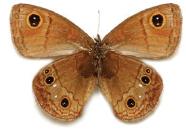
Calisto is a butterfly genus from the subfamily Satyrinae in the family Nymphalidae. The genus was erected by Jacob Hübner in 1823. Members of the genus occur on the Caribbean islands only. Of the 44 species that are currently thought to exist, eleven occur on Cuba, one on Puerto Rico, one on Anegada Island, one on Jamaica, two on the Bahamas and twenty-eight on Hispaniola.

Calisto debarriera is a butterfly of the family Nymphalidae. It is endemic to Hispaniola.
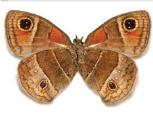
Calisto hysius is a butterfly of the family Nymphalidae. It is endemic to Hispaniola.
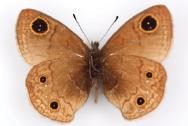
Calisto grannus is a butterfly of the family Nymphalidae. It is endemic to Hispaniola, where it is generally found on altitudes above 1000 meters.

Calisto batesi is a butterfly of the family Nymphalidae. It is endemic to Hispaniola.
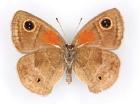
Calisto obscura is a butterfly of the family Nymphalidae. It is endemic to Hispaniola, where it is found in the lowlands and at mid-elevations.

Calisto archebates is a butterfly of the family Nymphalidae. It is endemic to Hispaniola, where it is found in the southern paleoisland's Sierra de Bahoruco.

Calisto confusa is a butterfly of the family Nymphalidae. It is endemic to Hispaniola, where it is mainly found in the lowlands.
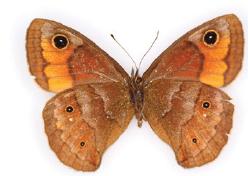
Calisto arcas is a butterfly of the family Nymphalidae. It is endemic to Hispaniola, where it is only found in the Cordillera Central's Valle Nuevo area.

Calisto chrysaoros is a butterfly of the family Nymphalidae. It is endemic to Hispaniola, where it is found at high elevations on both southern and northern paleoislands in the refugias.

Calisto eleleus is a butterfly of the family Nymphalidae. It is endemic to Hispaniola, where it is found extremely locally in the Cordillera Central.

Calisto crypta is a butterfly of the family Nymphalidae. It is endemic to Hispaniola, where it is found in the lowland desert.

Calisto lyceius is a butterfly of the family Nymphalidae. It is endemic to Hispaniola, where it is found in the lowland desert.

Calisto franciscoi is a butterfly of the family Nymphalidae. It is endemic to parts of Hispaniola, where it is found in the lowland desert.

Calisto tasajera is a butterfly of the family Nymphalidae. It is endemic to Hispaniola, where it is found in the highlands of the Cordillera Central.

Calisto pulchella is a butterfly of the family Nymphalidae. Described by Percy Ireland Lathy in 1899, it is endemic to Hispaniola.
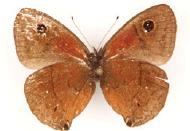
Calisto raburni is a butterfly of the family Nymphalidae. It is endemic to Hispaniola.

Calisto herophile is a butterfly of the family Nymphalidae. It is endemic to Cuba and the Bahamas. The species inhabits many habitats in Cuba, from suburban areas near major cities to the edges of evergreen and rainforests up to 1,100 meters of altitude, always disturbed in some degree.

Calisto nubila is a butterfly of the family Nymphalidae. It is endemic to Puerto Rico.

Calisto bradleyi is a butterfly of the family Nymphalidae. It is endemic to Cuba, where it is found in the major mountain range of western Cuba, Guaniguanico, from El Taburete, at Sierra del Rosario, west to Viñales valley, always at low elevations.



